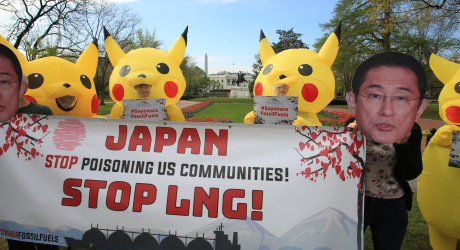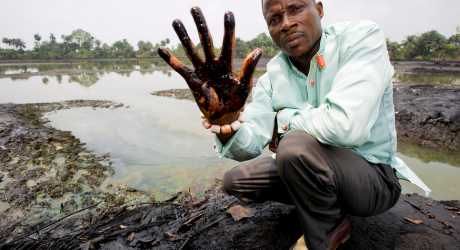GLOBAL POLICY
The Paris climate goals demand a rapid, just transition from fossil fuels to clean energy. We’re pushing governments to lead the way by adopting policies to end oil and gas production.
OVERVIEW OF WORK
In order to achieve climate goals, governments and other decision makers must support a just and equitable move away from fossil fuels. We are pushing for precedent-setting leadership from governments to put policies in place to manage the decline of oil and gas and ensure a just transition for fossil-fuel dependent workers and communities.
Building from a growing group of first mover governments, we are pressuring for increasing numbers of national and regional governments to end new licenses and permits for oil and gas production, and to develop plans to wind down their existing production over time.
LATEST PROGRAM POSTS
Japan is continuing to drive the expansion of fossil fuels across Asia and is derailing the transition to renewable energy. This harms communities and ecosystems, undermines energy security, and worsens the climate crisis. The facts speak for themselves.
A letter delivered to U.S. President Biden from 560+ organizations around the world applauded Biden's decision to halt pending LNG export approvals and called on him to expand the pause to halt all permitting of new LNG infrastructure and export projects.
Last month, it was widely reported that another chapter in Shell’s dirty and disastrous eighty-seven-year operations in the Niger Delta was coming to an end, with the company selling its onshore business.
While Manchin and his industry allies spread tired old myths about America saving the world from Putin and Chinese coal plants, the reality is the energy transition is already moving away from gas faster than most people think. That action needs to focus on a phase-out of all fossil fuel exports and protections and reparations for the frontline communities.
LATEST PROGRAM RESEARCH
New Briefing: Despite pledging to stop international financing for fossil fuel projects by the end of 2022, the Italian Government is continuing to actively consider financing for major international fossil fuel projects that could emit greenhouse gas emissions equivalent to at least 3.5 times Italy’s annual emissions.
The briefing reveals that new oil and gas production approved to date in 2022 and at risk of approval over the next three years could cumulatively lock in 70 billion tonnes (Gt) of new carbon pollution. This is equivalent to almost two years’ worth of global carbon emissions from energy at current levels, 17 percent of the world’s remaining 1.5°C carbon budget, or the lifecycle emissions of 468 coal power plants.
This briefing, "Japan's Dirty Secret: World's top fossil fuel financier is fueling climate chaos and undermining energy security," reveals that Japan is the world’s largest public financier of fossil fuel projects, providing 10.6 billion USD per year between 2019 and 2021. Japan has been leading the drive to expand gas consumption in Asia and is the world’s leading financier of gas infrastructure globally, spending USD 6.7 billion on gas projects on average each year between 2019 and 2021.




